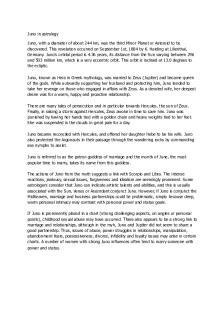Arabic astronomy and astrology PDF

| Title | Arabic astronomy and astrology |
|---|---|
| Author | George Saliba |
| Pages | 19 |
| File Size | 14.9 MB |
| File Type | |
| Total Downloads | 65 |
| Total Views | 141 |
Summary
ANCIENT AND CLASSICAL SCIENCES AND PHILOSOPHY LES DOCTRINES DE LA SCIENCE DE L'ANTIQUITE A L' AGE CLASSIQUE EDI'rEPAR Roshdi RASHED et Joel BIARD PEETERS 1999 ASTRONOMY AND ASTROLOGY IN MEDIEVAL . ARABIC THOUGHT George SALIBA In this paper I attempt to document the conceptual distinction...
Description
ANCIENT AND CLASSICAL SCIENCES AND PHILOSOPHY
LES DOCTRINES DE LA SCIENCE DE L'ANTIQUITE A L' AGE CLASSIQUE
EDI'rEPAR
Roshdi RASHED et Joel BIARD
PEETERS 1999
ASTRONOMY AND ASTROLOGY IN MEDIEVAL . ARABIC THOUGHT George SALIBA
In this paper I attempt to document the conceptual distinction made during medieval Islamic times between the science of astrology and that of astronomy. This distinction is important in light of the fact that to most people studying the history of Islam the two disciplines are thought to be identical. Those people even attempt to explain the rise of early Arabic astronomy as having been motivated by practical astrological considerations1. What I will attempt to do is to establish the distinction between those two disciplines as it can be gleaned from the following types of sources. I will first isolate the distinction commonly accepted in the Greek sources of antiquity. Then I will discuss the reflection of that distinction in the early Arabic sources, and follow up the developments in the technical texts dealing with the two disciplines in later medieval times. Then I will tum to the non-technical texts in order to assess the social perception of these two disciplines, thus hoping to determine their social status and thereby assess their place within the general framework of the sciences. ASTROLOGY/ASTRONOMY IN THE GREEK SOURCES
In order to illustrate the distinction between astrology and astronomy, I would like to refer to the introductions of Ptolemy's books on these subjects. In the Almagest, Ptolemy claims that he was following Aristotle in dividing the sciences into theoretical and practical disciplines 2. Of the theoretical disciplines, namely metaphysics, physics and mathematics, he distinguishes the mathematical sciences as the only ones that do not 1
a「セゥエィL@
See, for example, E. S. Kennedy, "The Arabic Heritage in the Exact Sciences", Al23 (1970), p. 327-344, esp. p. 329, and Seyyed Hossein Nasr, An Introduction of Islamic Cosmological Doctrines, Shambala, Boulder, 1978, p. 75. The most recent echo of this attitude is to be found in Albert Hourani, A History of the Arab Peoples, Belknap Press, Cambridge (Mass.), 1991, p. 76. 2 See Ptolemy, The Almagest, Ms. B.N. Tunisia, No. 7116, fol. P, tr. G. Toomer, Springer, NY, 1984, p. 35.
132
ASTRONOMY AND ASTROLOGY
G. SALIBA
depend on guessing, in contradistinction to metaphysics whose subject cannot be known with certainty for "it cannot be seen nor could it be comprehended3", and physics whose subject is the elements that are continually changing and regarding which the philosophers (l:zukama') are never in agreement. Only the mathematical sciences are capable of giving certain and.unchanging knowledge to those who pursue them in earnest, just because the proofs in those sciences are demonstrative and do not allow any doubt for they involve numbers and geometric entities. Of the mathematical sciences themselves, astronomy, the subject of the book, is the highest, for, according to Ptolemy, it deals with the eternal unchanging motions of the celestial bodies. He then goes on to say that in that capacity astronomy serves the remaining two disciplines. In the Tetrabiblos, the discipline of astrology is spoken of in relation to astronomy in the following terms4 • Ptolemy admits outright that of the two "means of prediction (7tpoyvounK...
Similar Free PDFs

Arabic astronomy and astrology
- 19 Pages

Spritual astrology
- 285 Pages

Astronomy
- 4 Pages

Astronomy
- 19 Pages

Mastering arabic Pdf
- 26 Pages

Arabic quiz 5
- 4 Pages

Saqiya - Arabic exercise book
- 100 Pages

Astrology notes 101 lecture
- 64 Pages

Stellarium Astrology Lab
- 8 Pages
Popular Institutions
- Tinajero National High School - Annex
- Politeknik Caltex Riau
- Yokohama City University
- SGT University
- University of Al-Qadisiyah
- Divine Word College of Vigan
- Techniek College Rotterdam
- Universidade de Santiago
- Universiti Teknologi MARA Cawangan Johor Kampus Pasir Gudang
- Poltekkes Kemenkes Yogyakarta
- Baguio City National High School
- Colegio san marcos
- preparatoria uno
- Centro de Bachillerato Tecnológico Industrial y de Servicios No. 107
- Dalian Maritime University
- Quang Trung Secondary School
- Colegio Tecnológico en Informática
- Corporación Regional de Educación Superior
- Grupo CEDVA
- Dar Al Uloom University
- Centro de Estudios Preuniversitarios de la Universidad Nacional de Ingeniería
- 上智大学
- Aakash International School, Nuna Majara
- San Felipe Neri Catholic School
- Kang Chiao International School - New Taipei City
- Misamis Occidental National High School
- Institución Educativa Escuela Normal Juan Ladrilleros
- Kolehiyo ng Pantukan
- Batanes State College
- Instituto Continental
- Sekolah Menengah Kejuruan Kesehatan Kaltara (Tarakan)
- Colegio de La Inmaculada Concepcion - Cebu






